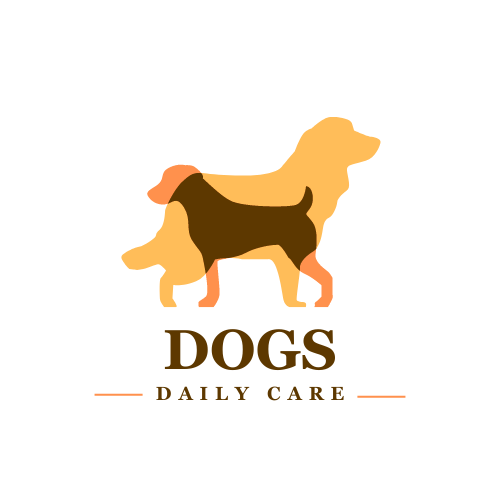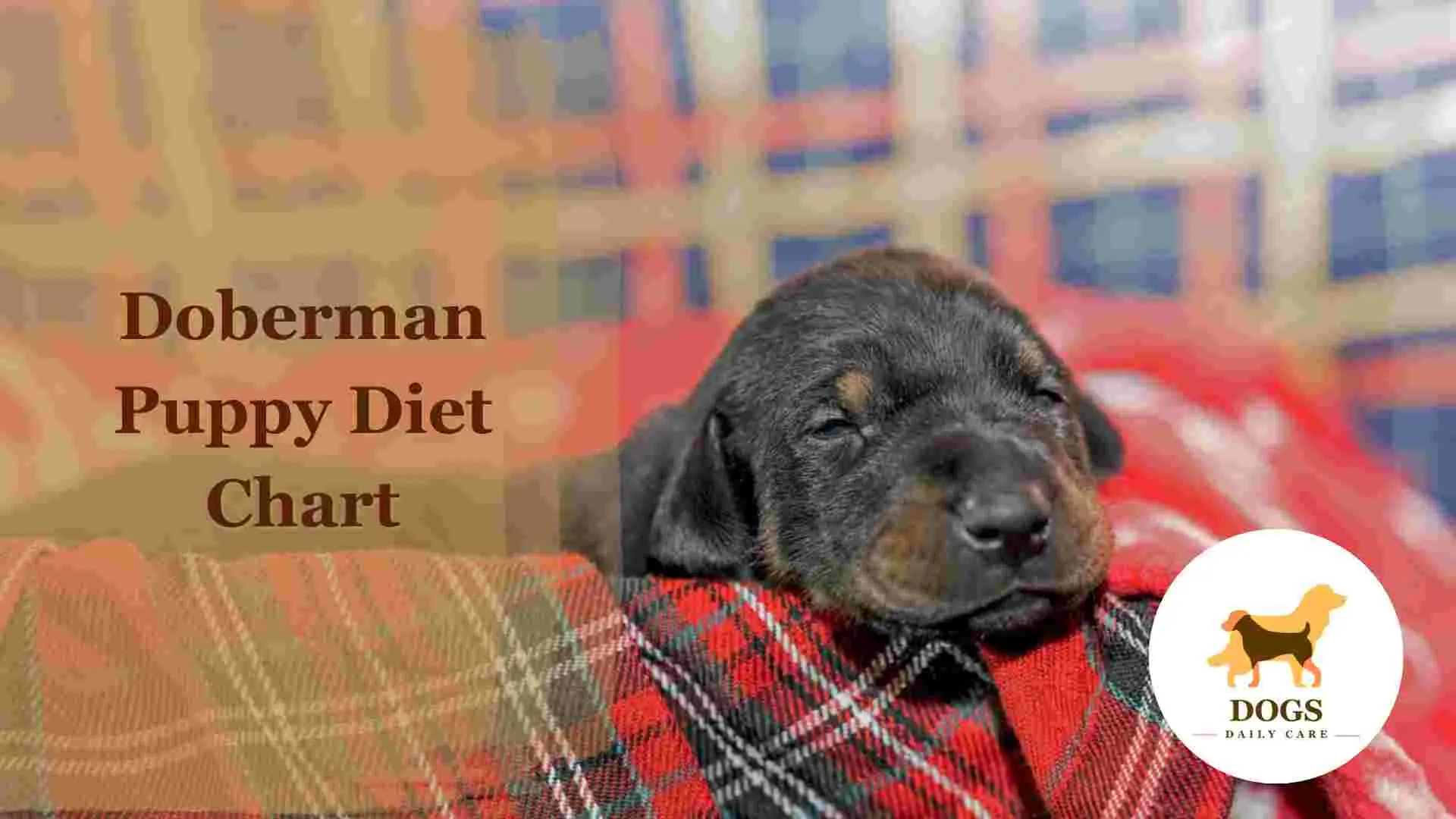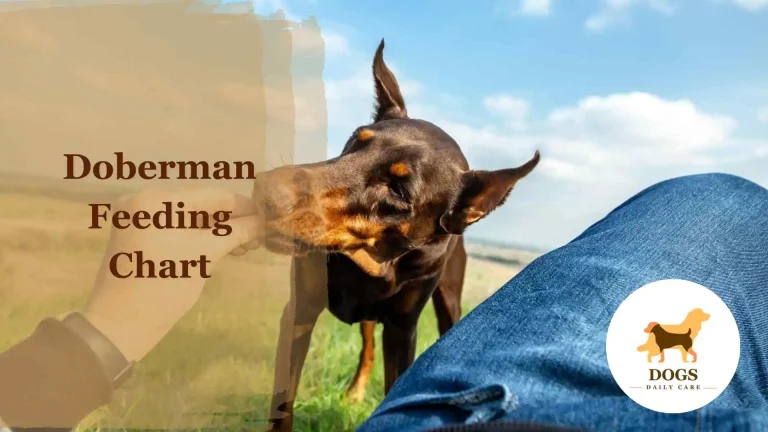Doberman Puppy Diet Chart – All In One Guide
Welcoming a Doberman puppy into your home is an exciting journey filled with playful moments and unique challenges. One of the key aspects of raising a healthy and happy Doberman is understanding their dietary needs. Puppies of this breed have specific nutritional requirements that are crucial for their growth and overall health. A well-balanced diet not only supports their physical development but also plays a significant role in their cognitive and behavioral progress. This guide is designed to help you navigate the complexities of feeding your Doberman puppy, ensuring they get the best start in life.
In this comprehensive guide, we’ll explore the ideal diet for a Doberman puppy, tailored to their distinctive needs. From essential nutrients to age-appropriate feeding schedules, we’ve got you covered. Whether you’re a first-time Doberman owner or looking to refine your puppy’s diet, our tips and insights will provide you with the knowledge to make informed decisions for your furry companion’s well-being. To know about a adult Doberman Feeding Chart click here.
Understanding a Doberman Puppy’s Nutritional Needs
Doberman puppies are known for their energy and rapid growth. To support this, they need a diet rich in specific nutrients. Protein is the cornerstone of their diet. It helps build muscles, organs, and is essential for overall growth. Look for high-quality protein sources like chicken, beef, or fish in puppy food.
Next, let’s talk about fats. Healthy fats are vital for energy and development. They also keep your puppy’s coat shiny. Omega-3 and Omega-6 fatty acids, found in fish and some plant oils, are especially important.
Carbohydrates are another key component. They provide energy and help with digestion. Good sources include brown rice and vegetables. Remember, Doberman puppies need more than just calories. They need the right balance of nutrients.
Vitamins and minerals are also crucial. They support bone health, nerve function, and immune system strength. Puppy food should include a balanced mix of essential vitamins and minerals. Calcium and phosphorus, for example, are important for strong bones and teeth.
Lastly, water is essential. Always make sure your Doberman puppy has access to fresh, clean water. Hydration is as important as food for their health and well-being.
Key Components of a Doberman Puppy Diet
When planning your Doberman puppy’s diet, it’s important to focus on a few essential components. First, protein: it’s the building block of your puppy’s diet. Quality sources like chicken, lamb, or fish should be at the top of the list. These help your puppy grow strong muscles and keep them energetic.
Next, we have fats. They’re not just for energy; they also make food taste better for your pup. Look for foods with healthy fats like fish oil. These fats help keep your puppy’s coat glossy and skin healthy.
Carbohydrates are also important. They give your Doberman puppy the energy to play and learn. Whole grains like brown rice or oats are good choices. They’re easy on your puppy’s stomach and help with digestion.
Vitamins and minerals play a big role too. They support everything from bone growth to healthy teeth. Foods rich in calcium and phosphorus are particularly important for Doberman puppies.
Lastly, water is vital. Always ensure your puppy has access to fresh water. It’s key for their overall health and helps them digest their food properly.
Age-Specific Diet Chart for Doberman Puppies

Feeding a Doberman puppy the right food at each stage of their early life is crucial. Here’s a simple guide:
Remember, the portion size matters. Puppies grow fast and need more food than adults, but overfeeding can cause health issues. Also, always provide freshwater.
Recommended Foods and Those to Avoid for Doberman Puppies
Feeding your Doberman puppy the right foods is as important as knowing what to avoid. Let’s look at the best choices and what to steer clear of.
Recommended Foods
- Lean Meats: Chicken, turkey, and beef are great for protein.
- Whole Grains: Brown rice and oats provide energy without being harsh on their stomach.
- Vegetables: Carrots, green beans, and broccoli offer vitamins and are good for digestion.
- Fruits in moderation: Apples and blueberries are great for a treat. They’re full of nutrients.
Foods to Avoid:
- Chocolate and caffeine: These can be toxic to dogs.
- Grapes and raisins: They can cause kidney problems.
- Onions and garlic: Harmful to a dog’s red blood cells.
- Fatty foods and bones: Can lead to obesity and are choking hazards.
Always choose foods that are safe and healthy for your Doberman puppy. When in doubt, it’s best to check with your vet.
Homemade vs. Commercial Diets for Doberman Puppies
Choosing between homemade and commercial diets for your Doberman puppy is important. Let’s explore both options.
Homemade Diets:
- Pros: You control the ingredients, ensuring fresh, high-quality food. It’s easier to avoid allergens and cater to specific dietary needs.
- Cons: Time-consuming and requires knowledge of canine nutrition. Risk of nutritional imbalances if not carefully planned.
Commercial Diets:
- Pros: Convenient and designed to be nutritionally balanced. Often formulated specifically for puppies’ developmental stages.
- Cons: Quality varies between brands. Some may contain fillers or additives that aren’t ideal for your puppy’s health.
When deciding, consider your lifestyle and your puppy’s health needs. If you opt for homemade diets, consulting with a vet or a canine nutritionist is crucial to ensure all nutritional needs are met. For commercial diets, choose high-quality, reputable brands.
Frequently Asked Questions (FAQs) About Doberman Puppy Diets
1. What is the best protein source for Doberman puppies?
High-quality proteins like chicken, beef, and fish are excellent for Doberman puppies. They provide the essential amino acids needed for muscle growth and overall development.
2. How often should I feed my Doberman puppy?
Doberman puppies typically need to eat three to four times a day. This can change as they grow, so it’s important to adjust their feeding schedule according to their age and size.
3. Can Doberman puppies eat adult dog food?
It’s not recommended. Puppies have different nutritional needs than adult dogs. Puppy food is formulated to support their rapid growth and development.
4. Are there any specific foods I should avoid giving my Doberman puppy?
Yes, avoid chocolate, caffeine, grapes, raisins, onions, garlic, and high-fat foods. These can be harmful to puppies and should be kept out of their diet.
5. Is it necessary to give supplements to my Doberman puppy?
Generally, a well-balanced puppy food provides all the necessary nutrients. However, in some cases, supplements might be needed. Always consult with a vet before adding supplements to your puppy’s diet.
Conclusion
Ensuring your Doberman puppy gets the right nutrition is key to their health and happiness. By understanding their dietary needs, choosing the right foods, and avoiding harmful ones, you’re setting the foundation for a healthy, active life. Remember, each puppy is unique, and their dietary needs may vary. Regular check-ups with a veterinarian can help tailor their diet more precisely, ensuring they get everything they need to thrive.
As your Doberman puppy grows, keep adapting their diet to suit their changing needs. A well-balanced diet is not just about the present; it’s an investment in your puppy’s future health and well-being. We hope this guide has been a valuable resource in your journey as a Doberman owner. For more information on raising happy, healthy pets, stay tuned to our blog.




